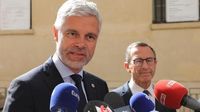On April 8, 2025, Laurent Wauquiez, the head of the Republican deputies in France, sparked a political uproar with his controversial proposal to "imprison" foreign nationals deemed dangerous and subject to an obligation to leave French territory (OQTF) in Saint-Pierre-et-Miquelon, a French archipelago located off the coast of Canada. This proposal, made during an interview with JDNews, has drawn sharp criticism from various political figures across the spectrum.
Wauquiez suggested that these individuals would have the option to either relocate to Saint-Pierre-et-Miquelon or return to their home countries. He emphasized that the archipelago's non-Schengen status would block any attempts to return to mainland France, thereby enforcing his idea of exile. "They would have a single alternative: either go to Saint-Pierre-et-Miquelon or return home," he stated in the interview.
In making his case, Wauquiez noted the harsh climate of Saint-Pierre-et-Miquelon, where the average temperature hovers around 5 degrees Celsius, with 146 days of rain and snow each year. He claimed that the inhospitable conditions would encourage the individuals to reconsider their refusal to leave France. "I think that pretty quickly, it will make everyone reflect," he added.
Wauquiez, who is currently campaigning for the leadership of the Republicans against Interior Minister Bruno Retailleau, argued that the current administrative detention of foreigners under OQTF is limited to 90 days, excluding cases of terrorist offenses. He advocated for a significant extension of this detention period, drawing comparisons to the policies in Italy and the United Kingdom, where such durations are much longer.
The proposal has not gone unchallenged. Manuel Valls, the Minister for Overseas Territories, was quick to respond, declaring, "Saint-Pierre-et-Miquelon is part of France, not a prison or a detention center. No French territory deserves to be treated as a relegation zone." He further criticized the notion of forced exile as a colonial method, stating, "When one disrespects a territory, one risks disrespecting France as a whole." Valls's remarks highlighted the broader implications of Wauquiez's proposal, framing it as an affront to the integrity of French territories.
Marine Le Pen, leader of the National Rally, also condemned the idea, asserting that individuals under OQTF should be returned to their home countries, not placed in a French territory. "The inhabitants of Saint-Pierre-et-Miquelon are not second-class citizens!" she exclaimed on social media.
Stéphane Lenormand, the deputy representing Saint-Pierre-et-Miquelon, echoed these sentiments, lamenting the "contempt" displayed by Wauquiez towards the residents of the archipelago. He emphasized that the OQTF individuals should be sent back to their countries, not treated as burdens within France. "We are not France's garbage can," Lenormand stated, reflecting the concerns of local inhabitants regarding their treatment in national policy discussions.
The backlash against Wauquiez's proposal extended beyond the traditional political divide. Leftist politicians, including Alexis Corbière, criticized the idea as a regressive step reminiscent of historical penal practices. Corbière remarked, "When the leader of the French right reinvents the penal colony, abolished in 1938! The ideological pressure from the far right drives these people completely mad." This sentiment was mirrored by Pieyre-Alexandre Anglade, a member of the ruling coalition, who stated, "Everything that remains republican in Laurent Wauquiez is the name of his party!"
The political ramifications of Wauquiez's proposal are significant, especially in the context of the upcoming Republicans' congress, which will elect a new party president in mid-May. Wauquiez's radical stance appears aimed at solidifying his position within the party, particularly as he competes against Retailleau, who has seen a rise in popularity among right-wing voters following his handling of immigration issues.
Critics have pointed out the impracticality and ethical implications of Wauquiez's plan. Matthias Renault, a National Rally deputy, described the proposal as not only demagogic but also impractical, questioning the logistics of transporting and housing individuals in a remote location like Saint-Pierre-et-Miquelon. He raised concerns about the financial implications of such a move, suggesting that there are more viable alternatives for managing OQTF individuals within France.
As the political debate continues, Wauquiez's controversial proposal has ignited discussions about immigration policy in France, particularly regarding how the country treats foreign nationals deemed a threat to security. The intense reactions from various political factions underscore the sensitivity of immigration issues in French society and the lengths to which politicians will go to appeal to their bases.
With the political landscape in flux, Wauquiez's proposal may serve as a litmus test for the Republican party's direction and its approach to immigration in the future. As the nation watches closely, the implications of this debate will likely resonate far beyond the immediate political context, influencing public opinion and policy decisions in the years to come.









